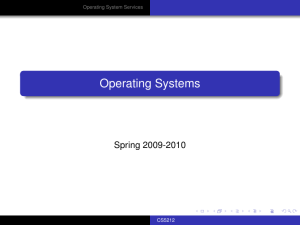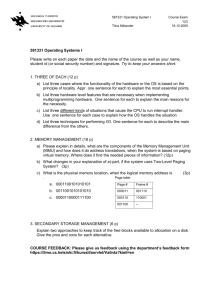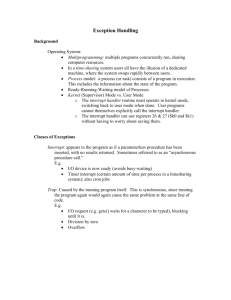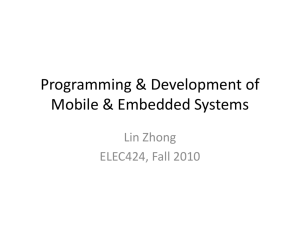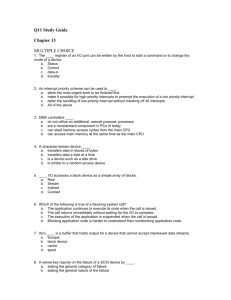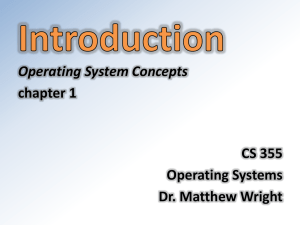pptx - MIT
advertisement
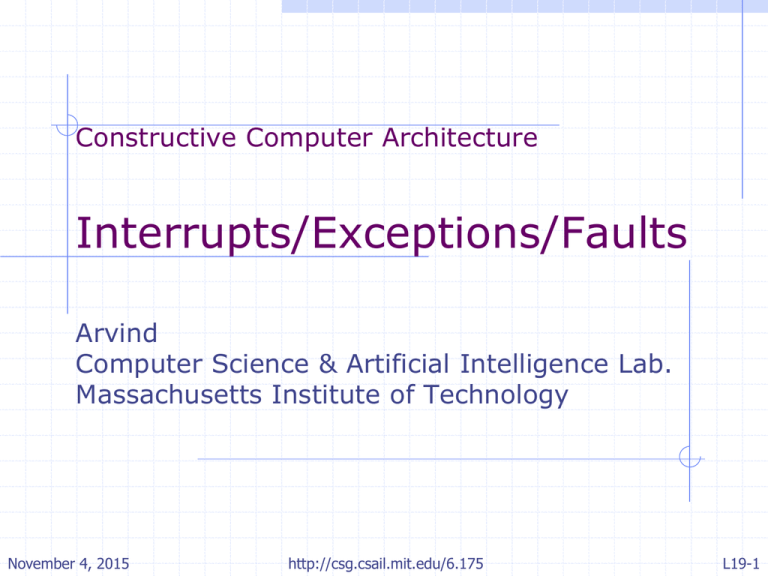
Constructive Computer Architecture
Interrupts/Exceptions/Faults
Arvind
Computer Science & Artificial Intelligence Lab.
Massachusetts Institute of Technology
November 4, 2015
http://csg.csail.mit.edu/6.175
L19-1
Hardware Software
Interactions
application
application
Application binary
interface (ABI)
Operating system
Hardware
Supervisor binary
interface (SBI)
Modern processors cannot function without some resident
programs (“services”), which are shared by all users
Usually such programs need some special registers which
are not visible to the users
Therefore all ISAs have extensions to deal with these
special registers
Furthermore, these special registers cannot be
manipulated by user programs; therefore user/privileged
mode is needed to use these instructions
November 4, 2015
http://csg.csail.mit.edu/6.175
L19-2
Interrupts
altering the normal flow of control
Ii-1
program
HI1
Ii
HI2
Ii+1
HIn
interrupt
handler
An external or internal event that needs to be processed by
another (system) program. The event is usually unexpected or
rare from program’s point of view.
November 4, 2015
http://csg.csail.mit.edu/6.175
L19-3
Causes of Interrupts
events that request the attention of the processor
Asynchronous: an external event
input/output device service-request/response
timer expiration
power disruptions, hardware failure
Synchronous: an internal event caused by the
execution of an instruction
exceptions: The instruction cannot be completed
undefined opcode, privileged instructions
arithmetic overflow, FPU exception
misaligned memory access
virtual memory exceptions: page faults,
TLB misses, protection violations
November 4, 2015
traps: Deliberately used by the programmer for a
purpose, e.g., a system call to jump into kernel
http://csg.csail.mit.edu/6.175
L19-4
Asynchronous Interrupts:
invoking the interrupt handler
An I/O device requests attention by asserting one
of the prioritized interrupt request lines
After the processor decides to process the
interrupt
It stops the current program at instruction Ii, completing
all the instructions up to Ii-1 (Precise interrupt)
It saves the PC of instruction Ii in a special register
It disables interrupts and transfers control to a
designated interrupt handler running in the privilege
mode
Privileged/user mode to prevent user programs from causing harm
to other users or OS
Usually speed is not the paramount concern in
handling interrupts
November 4, 2015
http://csg.csail.mit.edu/6.175
L19-5
Synchronous Interrupts
Requires undoing the effect of one or more
partially executed instructions
Exception: Since the instruction cannot be
completed, it is restarted if the exception can be
handled successfully
information about the exception has to be recorded and
conveyed to the exception handler
Trap: After a the kernel has processed a trap,
the instruction is typically considered to have
completed
system calls require changing the mode from user to privilege
November 4, 2015
http://csg.csail.mit.edu/6.175
L19-6
Synchronous Interrupt
Handling
Inst.
Mem
PC
PC address
Exception
Decode
Illegal
Opcode
Overflow
Overflow
Illegal Opcode
PC address Exception
Data address Exceptions
...
November 4, 2015
Data
Mem
+
http://csg.csail.mit.edu/6.175
WB
Data address
Exceptions
When an instruction
causes multiple
exceptions the first
one has to be
processed
L19-7
Architectural features for
Interrupt Handling
Special registers
mepc holds pc of the instruction that causes the interrupt
mcause indicates the cause of the interrupt
mscratch holds the pointer to HW-thread local storage for
saving context before handling the interrupt
mstatus
In RISC-V mepc, mcause and mstatus are some
of the Control and Status Registers (CSRs)
Special instructions
ERET (environment return) to return from an exception/fault
handler program using mepc. It restores the previous interrupt
state, mode, cause register, …
Instruction to manipulate and move CSRs into GPRs
need a way to mask further interrupts at least until mepc can
be saved
RISC-V has four modes; we deal with
only user and machine modes
November 4, 2015
http://csg.csail.mit.edu/6.175
L19-8
Status register
31 …
12
Other status bits
2 1
0
prv3 ie3 prv2 ie2 prv1 ie1 prv0 ie0
Privilege
mode
interrupt
enabled?
Keeps track of three previous interrupts to
speed up control transfer
When an interrupt is taken, (privilege, disabled) is
pushed on to stack
The stack is popped by the ERET instruction
The default value is (user, enabled)
November 4, 2015
http://csg.csail.mit.edu/6.175
L19-9
Interrupt Handling
System calls
A system call instruction causes an interrupt when
it reaches the execute stage
decoder recognizes a SCALL instruction
current pc is stored in mepc
mcause is set to the value defined for system calls
the processor is switched to privileged mode and disables
interrupt by pushing (Priv, disable) into mstatus
PC is redirected to the Exception handler which is
available in the mtvec for the user mode
The effective meaning of the SCALL instruction is defined
by the kernel; a convention
Processor can’t
Register a7 contains the desired function,
function without
register a0,a1,a2 contain the arguments,
the cooperation
result is returned in register a0
of the software
Single-cycle implementation is given at the end
November 4, 2015
http://csg.csail.mit.edu/6.175
L19-10
Software for interrupt
handling
The hardware transfers the control to the
software interrupt handler (IH)
IH takes following steps:
Save all GPRs into the memory pointed by mscratch
The memory serves as a local stack for interrupt handling
Pass mcause, mepc, stack pointer to a C function, which
is supposed to handle this interrupt
On the return from the C handler, write the return value
to mepc
Load all GPRs from the memory
Execute ERET, which does:
set pc to mepc
pop mstatus (mode, enable) stack
November 4, 2015
http://csg.csail.mit.edu/6.175
L19-11
Interrupt handler- SW
handler_entry: # fixed entry point for each mode
# for user mode the address is 0x100
j interrupt_handler # One level of indirection
interrupt_handler: # Common wrapper for all IH
# get the pointer to HW-thread local stack
csrrw sp, mscratch, sp # swap sp and mscratch
# save x1, x3 ~ x31 to stack (x2 is sp, save later)
addi sp, sp, -128
sw x1, 4(sp)
sw x3, 12(sp)
...
sw x31, 124(sp)
# save original sp (now in mscratch) to stack
csrr s0, mscratch # store mscratch to s0
sw s0, 8(sp)
November 4, 2015
http://csg.csail.mit.edu/6.175
L19-12
Interrupt handler- SW
cont.
interrupt_handler:
... # we have saved all GPRs to stack
# call C function to handle interrupt
csrr a0, mcause # arg 0: cause
csrr a1, mepc # arg 1: epc
mv a2, sp # arg 2: sp – pointer to all saved GPRs
jal c_handler # call C function
# return value is the PC to resume
csrw mepc, a0
# restore mscratch and all GPRs
addi s0, sp, 128; csrw mscratch, s0
lw x1, 4(sp); lw x3, 12(sp); ...; lw x31, 124(sp)
lw x2, 8(sp) # restore sp at last
eret # finish handling interrupt
November 4, 2015
http://csg.csail.mit.edu/6.175
L19-13
Interrupt handler- SW cont.
C function to handle interrupt
long c_handler(long cause, long epc, long *regs) {
// regs[i] refers to GPR xi stored in stack
if(cause == 0x08) { // cause code for SCALL is 8
// figure out the type of SCALL (stored in a7/x17)
// args are in a0/x10, a1/x11, a2/x12
long type = regs[17]; long arg0 = regs[10];
long arg1 = regs[11]; long arg2 = regs[12];
if(type == SysPrintChar) { ... }
else if(type == SysPrintInt) { ... }
else if(type == SysExit) { ... }
else ...
// SCALL finshes, we need to resume to epc + 4
return epc + 4;
} else if(cause == ...) { ... /* other causes */ }
else ...
}
November 4, 2015
http://csg.csail.mit.edu/6.175
L19-14
SW emulation
of MULT instruction
Another Example:
mul rd, rs1, rs2
Suppose there is no hardware multiplier. With proper
exception handlers we can implement unsupported
instructions in SW
MUL returns the low 32-bit result of rs1*rs2 into rd
MUL is decoded as an unsupported instruction and will
throw an Illegal Instruction exception
HW Jump to the same IH as in handling SCALL
SW handles the exception in c_handler() function
c_handler() checks the opcode and function code of MUL
to call the emulated multiply function
Control is resumed after emulation is done (ERET)
November 4, 2015
http://csg.csail.mit.edu/6.175
L19-15
Interrupt handler- SW
cont.
long c_handler(long cause, long epc, long *regs) {
if(cause == 0x08) { ... /* handle SCALL */ }
else if(cause == 0x02) {
// cause code for Illegal Instruction is 2
uint32_t inst = *((uint32_t*)epc); // fetch inst
// check opcode & function codes
if((inst & MASK_MUL) == MATCH_MUL) {
// is MUL, extract rd, rs1, rs2 fields
int rd = (inst >> 7) & 0x01F;
int rs1 = ...; int rs2 = ...;
// emulate regs[rd] = regs[rs1] * regs[rs2]
emulate_multiply(rd, rs1, rs2, regs);
return epc + 4; // done, resume at epc+4
} else ... // try to match other inst
} else ... // other causes
}
November 4, 2015
http://csg.csail.mit.edu/6.175
L19-16
Exception handling in
pipeline machines
November 4, 2015
http://csg.csail.mit.edu/6.175
L19-17
PC address
Exception
Select
Handler
PC
Kill F
Stage
D
Decode
E
Illegal
Opcode
+
M
Overflow
Ex
D
Ex
E
Ex
M
PC
D
PC
E
PC
M
Kill D
Stage
Kill E
Stage
Data
Mem
W
Data address
Exceptions
External
Interrupts
Cause
Inst.
Mem
PC
Commit
Point
EPC
Exception Handling
Kill
Writeback
1. An instruction may cause multiple exceptions; which
from the earliest stage
one should we process?
2. When multiple instructions are causing exceptions;
which one should we process first? from the oldest instruction
November 4, 2015
http://csg.csail.mit.edu/6.175
L19-18
